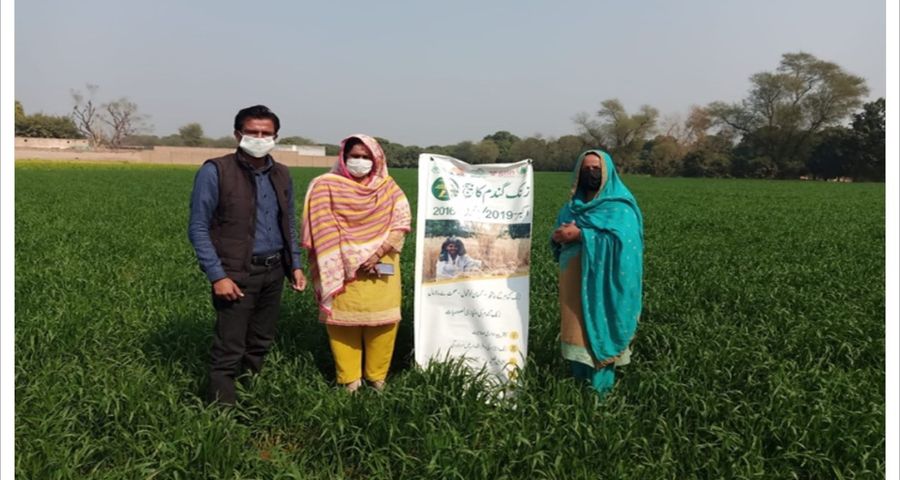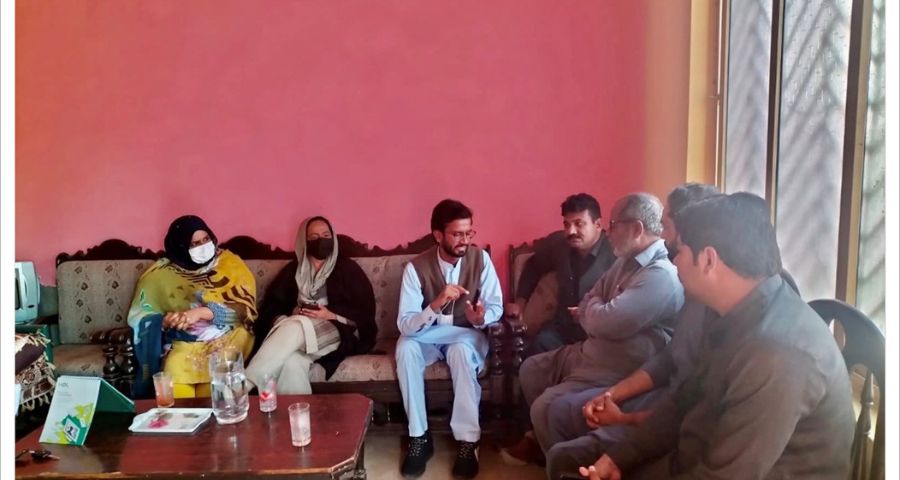According to a recent study by Rehman et al (2020) on the status of agronomic biofortification of zinc in Pakistan, zinc deficiency is an emerging health problem affecting about 22.6% of the children . Signs and symptoms caused by zinc deficiency are stunted growth, lower mental development in the children, poor appetite, weight loss, delayed healing of wounds, taste abnormalities, and mental lethargy.[1]
From November 2021, GAIN’s CBC’s programme embarked on a demand creation campaign to increase the consumption of biofortified zinc wheat in the Khanewal District of Pakistan. The campaign was implemented through a project titled ‘Strengthening the supply value chain of wheat from farmers to consumers’ which prioritized the identification of champions within public and private sectors and leverage on their infrastructure to increase the consumption of Zinc Wheat in Khanewal District. One of the champions that GAIN identified to bolster the demand creation campaign in Khanewal district was a middle-aged lady from Cha Tolay Wala, Tehsil Wala, Punjab named Naheed Akhtar.
Naheed, a local farmer and nutrition activist in Khanewal champions for the elimination of Zinc deficiency in humans by increasing the consumption of biofortified zinc wheat varieties Akbar-19 and Zincol-16.

Naheed is a mother of 2 children and owns 8 acres of land with over 15 years’ experience in agriculture. She is also a biofortified zinc wheat crop champion in Khanewal who was onboarded during the CBC programme trainings with farmers at field level with the coordination of Field Assistant from the Agriculture Extension Department in Pakistan. It was through attending these Agricultural extension departmental monthly meetings that Naheed came across CBC programme and received an invitation from the CBC programme team to attend a biofortified zinc wheat demand creation training workshop that was carried out in her village of Cha Tolay Wala with the collaboration of the Pakistan Agriculture Department. It was during this training that Naheed came to know of the impacts of the dire situation of zinc malnutrition.
‘‘I did not know that zinc deficiency in humans can be reduced through fortification which entails the enrichment of food products during processing or supplementation. This can be expensive and not sustainable,’’ says Naheed.
It was during this training which was led by a CBC programme agronomist that Naheed came to learn that the adoption of genetic approaches are not limited to cultivation of different varieties of biofortified zinc wheat such as Zincol-16 and Akbar-19 but suitable and plant fertilizer applications also emerge as the major interventions for zinc biofortified crops.
‘‘Agronomic bio-fortification not only improves crop growth but also increases the crops' micronutrient mobilization and utilization potential. Zinc fertilization through either method is aimed to enhance the plant zinc uptake,’’ she adds.
The continued interactions with the CBC programme over the last 9 months has granted Naheed access to knowledge and information on seed availability and cultivation methods of emerging zinc wheat - Akbar-19 with higher potential of productivity and increased the profitability ratio. The CBC programme has created the linkages between the seed retailers for the provision of certified zinc wheat seed - Akbar-19. Naheed was able to purchase the certified seed of Akbar-19 which she sowed on 4 acres of her 8 acres piece of land in November 2021 with guidance from the CBC programme agronomist. She applied all the nutrients while adhering to the irrigation schedule as directed by the agronomist with a projected harvest yield of 50 plus mond per acre .
Naheed is now a champion for biofortified zinc wheat variety Akbar-19 and is educating women in Khanewal on the significance of new varieties to diminish zinc scarcity. She emphasizes about micronutrients intake, their role in the body and technology to improve their wheat production and profitability in Khanewal district. She does this through home visits where she gives talks and fliers to different households. So far, she has visited over 50 homes and successfully onboarded over 6 farmers in Khanewal who now cultivate the biofortified zinc wheat variety Akbar -19 across 42 acres of land in their own village. She encourages them to store the wheat grain of Akbar-19 for their own household consumption and for seed for next season.

‘‘I am grateful for the opportunity to meet with GAIN, who are implementing an impactful project that has improved my life and can be scaled to improve the lives of many people here in Khanewal.’’ She concludes.
References
[1] Rehman A, Farroq M., Ullah A., Nadeem F., Im SY., Park SK. and Lee DJ (2020) Agronomic Biofortification of Zinc in Pakistan: Status, Benefits, and Constraints: https://doi.org/10.3389/fsufs.2020.591722
Additional resources
The Commercialisation of Biofortified Crops Programme is facilitated by the Global Alliance for Improved Nutrition and HarvestPlus, through the generous support of MFA and BMZ.